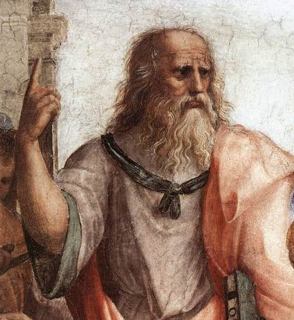
In philosophy, the term idealism identifies and describes metaphysical perspectives which assert that reality is indistinguishable and inseparable from human perception and understanding; that reality is a mental construct closely connected to ideas. Idealist perspectives are in two categories: (i) Subjective idealism, which proposes that a material object exists only to the extent that a human being perceives the object; and (ii) Objective idealism, which proposes the existence of an objective consciousness that exists prior to and independently of human consciousness, thus the existence of the object is independent of human perception.
Philosophy of religion is "the philosophical examination of the central themes and concepts involved in religious traditions". Philosophical discussions on such topics date from ancient times, and appear in the earliest known texts concerning philosophy. The field is related to many other branches of philosophy, including metaphysics, epistemology, and ethics.
Skepticism or scepticism is generally a questioning attitude or doubt towards one or more putative instances of knowledge which are asserted to be mere belief or dogma. Formally, skepticism is a topic of interest in philosophy, particularly epistemology. More informally, skepticism as an expression of questioning or doubt can be applied to any topic, such as politics, religion, or pseudoscience. It is often applied within restricted domains, such as morality, theism, or the supernatural.

Reason is the capacity of consciously applying logic by drawing conclusions from new or existing information, with the aim of seeking the truth. It is closely associated with such characteristically human activities as philosophy, science, language, mathematics, and art, and is normally considered to be a distinguishing ability possessed by humans. Reason is sometimes referred to as rationality.
Relativism is a family of philosophical views which deny claims to objectivity within a particular domain and assert that valuations in that domain are relative to the perspective of an observer or the context in which they are assessed. There are many different forms of relativism, with a great deal of variation in scope and differing degrees of controversy among them. Moral relativism encompasses the differences in moral judgments among people and cultures. Epistemic relativism holds that there are no absolute principles regarding normative belief, justification, or rationality, and that there are only relative ones. Alethic relativism is the doctrine that there are no absolute truths, i.e., that truth is always relative to some particular frame of reference, such as a language or a culture. Some forms of relativism also bear a resemblance to philosophical skepticism. Descriptive relativism seeks to describe the differences among cultures and people without evaluation, while normative relativism evaluates the morality or truthfulness of views within a given framework.
Moral relativism or ethical relativism is a term used to describe several philosophical positions concerned with the differences in moral judgments across different peoples and their own particular cultures. An advocate of such ideas is often labeled simply as a relativist for short. In detail, descriptive moral relativism holds only that people do, in fact, disagree fundamentally about what is moral, with no judgment being expressed on the desirability of this. Meta-ethical moral relativism holds that in such disagreements, nobody is objectively right or wrong. Normative moral relativism holds that because nobody is right or wrong, everyone ought to tolerate the behavior of others even when considerably large disagreements about the morality of particular things exist.
Solipsism is the philosophical idea that only one's mind is sure to exist. As an epistemological position, solipsism holds that knowledge of anything outside one's own mind is unsure; the external world and other minds cannot be known and might not exist outside the mind.
Experience refers to conscious events in general, more specifically to perceptions, or to the practical knowledge and familiarity that is produced by these conscious processes. Understood as a conscious event in the widest sense, experience involves a subject to which various items are presented. In this sense, seeing a yellow bird on a branch presents the subject with the objects "bird" and "branch", the relation between them and the property "yellow". Unreal items may be included as well, which happens when experiencing hallucinations or dreams. When understood in a more restricted sense, only sensory consciousness counts as experience. In this sense, experience is usually identified with perception and contrasted with other types of conscious events, like thinking or imagining. In a slightly different sense, experience refers not to the conscious events themselves but to the practical knowledge and familiarity they produce. In this sense, it is important that direct perceptual contact with the external world is the source of knowledge. So an experienced hiker is someone who actually lived through many hikes, not someone who merely read many books about hiking. This is associated both with recurrent past acquaintance and the abilities learned through them.

Eliminative materialism is a materialist position in the philosophy of mind. It is the idea that the majority of the mental states in modern psychology do not exist. Some supporters of eliminativism argue that no coherent neural basis will be found for many everyday psychological concepts such as belief or desire, since they are poorly defined. Rather, they argue that psychological concepts of behaviour and experience should be judged by how well they reduce to the biological level. Other versions entail the non-existence of conscious mental states such as pain and visual perceptions.

The is–ought problem, as articulated by the Scottish philosopher and historian David Hume, arises when one makes claims about what ought to be that are based solely on statements about what is. Hume found that there seems to be a significant difference between positive statements and prescriptive or normative statements, and that it is not obvious how one can coherently move from descriptive statements to prescriptive ones. Hume's law or Hume's guillotine is the thesis that, if a reasoner only has access to non-moral and non-evaluative factual premises, the reasoner cannot logically infer the truth of moral statements.

Beyond Good and Evil: Prelude to a Philosophy of the Future is a book by philosopher Friedrich Nietzsche that covers ideas in his previous work Thus Spoke Zarathustra but with a more polemical approach. It was first published in 1886 under the publishing house C. G. Naumann of Leipzig at the author's own expense and first translated into English by Helen Zimmern, who was two years younger than Nietzsche and knew the author.

Mary Beatrice Midgley was a British philosopher. A senior lecturer in philosophy at Newcastle University, she was known for her work on science, ethics and animal rights. She wrote her first book, Beast And Man (1978), when she was in her fifties, and went on to write over 15 more, including Animals and Why They Matter (1983), Wickedness (1984), The Ethical Primate (1994), Evolution as a Religion (1985), and Science as Salvation (1992). She was awarded honorary doctorates by Durham and Newcastle universities. Her autobiography, The Owl of Minerva, was published in 2005.

Ted Honderich is a Canadian-born British professor of philosophy, who was Grote Professor Emeritus of the Philosophy of Mind and Logic, University College London.

Moral nihilism is the meta-ethical view that nothing is morally right or wrong.
In philosophy of science and philosophy of mind, cognitive closure is the proposition that human minds are constitutionally incapable of solving certain perennial philosophical problems. Owen Flanagan calls this position anti-constructive naturalism or the "new mysterianism" and the primary advocate of the hypothesis, Colin McGinn, calls it transcendental naturalism acknowledging the possibility that solutions may be knowable to an intelligent non-human of some kind. According to McGinn, such philosophical questions include the mind-body problem, identity of the self, foundations of meaning, free will, and knowledge, both a priori and empirical.

The Philosophy of Freedom is the fundamental philosophical work of esotericist Rudolf Steiner (1861–1925). It addresses the question of whether and in what sense human beings can be said to be free. Originally published in 1894 in German as Die Philosophie der Freiheit, with a second edition published in 1918, the work has appeared under a number of English titles, including The Philosophy of Spiritual Activity, The Philosophy of Freedom, and Intuitive Thinking as a Spiritual Path.
The science of morality may refer to various forms of ethical naturalism grounding morality in rational, empirical consideration of the natural world. It is sometimes framed as using the scientific approach to determine what is right and wrong, in contrast to the widespread belief that "science has nothing to say on the subject of human values".

The Moral Landscape: How Science Can Determine Human Values is a 2010 book by Sam Harris, in which he promotes a science of morality and argues that many thinkers have long confused the relationship between morality, facts, and science. He aims to carve a third path between secularists who say morality is subjective and religionists who say that morality is dictated by God and scripture.
This is a list of philosophical literature articles.










